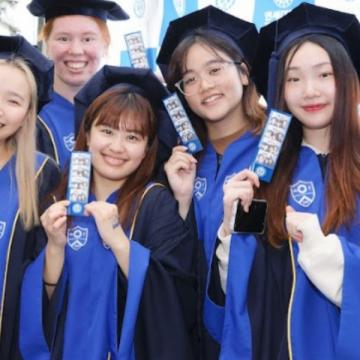
Global Exchange Insider: A Seoul summer at Yonsei University, South Korea
Are you a UBC undergrad thinking about going on a student exchange? It can...
Sending students into what Dr. Cindy Bourne calls “challenging contexts” can be hugely successful – or it can be disastrous. It all depends on preparation and how the program is designed. That’s what spurred Dr. Bourne to develop a framework with 11 design principles for overseas student programs that are contextual to communities while advancing university aims. “The question is, how do we use the place and scholarship of UBC in communities where we can do good?” she says.
Dr. Bourne is Coordinator of Graduate and Teaching Assistant Programs at the Centre for Teaching and Learning in the Office of the Provost at UBC Okanagan. Nowadays she helps faculty transform courses for online delivery. But her forté is crafting effective, adaptable programs, along with running student learning support. The bulk of her work over the past 14 years has revolved around her two passions: learning and literacy. Specifically, Dr. Bourne and her teacher candidates collaborated with school teachers in Ghana to produce suitable books for school children.
It wasn’t straightforward, though. Kids were reading donated books about things like lost mittens with narratives that had nothing to do with their own life experience. Together with junior high English classes, the teacher candidates put together books recounting elders’ traditional tales, which teetered on the brink of extinction. The books used the children’s own illustrations and pictures, which they photographed together with the teacher candidates at locations and shrines around the community. Also, given the importance placed on “mother tongue literacy” for beginner readers, Robyn Giffen, UBC Master’s student (2015), accompanied Dr. Bourne on the initial pilot. Giffen’s research in linguistics led to the development of a writing system allowing the Nab’t language (an oral language) to appear for the first time in the traditional stories. These are Dr. Bourne’s thoughts.
What we’re doing right: We go with the best intentions and we understand the power of scholarship.
What we’re getting wrong: Not asking, what is our point? How do we know our students are actually coming back with global citizenship skills? What measures do we have? Is it working? And finding a way to drill down.
Shayna Hvala and school children creating folding microscopes at Ghana's Kongo school (photo: Dr. Cindy Bourne)
Overarching goal: That UBC will take up these design principles and consider them as a framework for sending students overseas.
Current focus: A way to do things in an online environment. If we can help faculty here, what can we do globally? We are exploring how to broaden what we’re doing. Perhaps we do a meet-and-greet ahead of time, or can we include students in Ghana working with students here? If we can reimagine higher education in the space of a year and do it, then we can transfer that same power to international programming.
Biggest misconception: That we can send students abroad and they’ll be ready for whatever they encounter. In challenging contexts, things can go sideways very fast. The stakes are just higher. There’s sometimes a tendency for hubris, an inflated sense of what we can do; though that’s not to be mistaken for arrogance. Testing a novice skill set in difficult circumstances needs very careful consideration.
A local high school student in Ghana sharing the story in Nab’t for the first time (photo: Dr. Cindy Bourne)
Proudest moment: It’s always watching a project come together, in spite of the challenges; the sheer pleasure of seeing the collaboration and that evidence that global citizenship matters. Students notice global patterns. What I want them to do, and what makes me proud when they do it, is to ask, "How can you change these, and how can you make those changes back home?”
The impact of working abroad: I have an electric car. I buy as little as possible. It’s changed how I see my place in the world and what I use in the world. It makes you think about the consequence of your actions. It’s hard to justify jumping on a plane and flying everywhere. It has made me totally rethink travel.

Chief Sakkodaan, gathered with elders, reading the books at the official Nabdam District Book Launch in Ghana (photo: Dr. Susan Crichton)
Piece of advice: To students: Leave your assumptions behind. Engage with an open mind and a willingness to ask questions. If you ask questions, people know you’re not coming with the answers. Get off Instagram and into the community – as much as you can. Just embrace it. It can be so life changing.
What’s scary right now: The polarization around the world. It’s frightening and overwhelming. What scares me most is that so much of it stems from a lack of understanding and education. I believe our only way forward is through learning and education and engaging.
What the world needs: Optimism – an optimism that this next generation, given the right tools and guidance, is a powerful force for good.
Dr. Vida Yakong (right) with Dr. Cindy Bourne (photo: Dr. Cindy Bourne)
Read the Ghana school book, The Poor Farmer and the Egg Sakoti.
Find out more about design principles informing policy and practice.
Read Dr. Bourne’s case study on “designing good global-service learning projects in challenging contexts.”